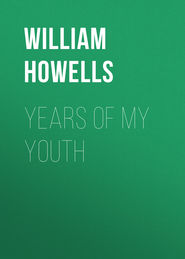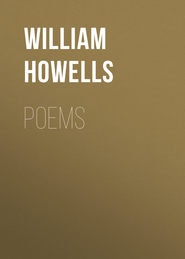По всем вопросам обращайтесь на: info@litportal.ru
(©) 2003-2025.
✖
The Daughter of the Storage
Настройки чтения
Размер шрифта
Высота строк
Поля
"I see. But since Christmas?"
"You know very well that after Christmas the book market drops dead."
"Yes, so I've been told." She had flung her wet veil back over her shoulders, and he thought she had never looked so adorably plain before; if she could have seen herself in a glass she would have found her whole face out of drawing. It seemed as if his thinking had put her in mind of them, and she said, "Those immoral mirrors are shameful."
"They've sold more of the best books than anything else."
"No matter. As soon as I get a little drier I shall take them down."
"Very well. I didn't put them up." He laid a log of hickory on the fire. "I'm not doing it to dry you quicker."
"Oh, I know. I'll tell you one thing. You ought to keep the magazines, or at least the Big Four. You could keep them with a good conscience, and you could sell them without reading; they're always good."
"There's an idea in that. I believe I'll try it."
Margaret Green was now dry enough, and she rose and removed the mirrors. In doing this she noticed that Erlcort had apparently sold a good many of his best books, and she said: "Well! I don't see why you should be discouraged."
"Who said I was? I'm exultant."
"Then you were exulting with the corners of your mouth down just now. Well, I must be going. Will you get a taxi to flounder over to the Subway with me?" While Erlcort was telephoning she was talking to him. "I believe the magazines will revive public interest in your scheme. Put them in your window. Try to get advance copies for it."
"You have a commercial genius, Margaret Green."
"When it comes to selling literature, I have. Selling art is where I fall down."
"That's because you always try to sell your own art. I should fall down, too, if I tried to sell my own literature."
They got quite back to their old friendliness; the coming of the taxi gave them plenty of time. The electric lights were turned brilliantly on, but there, at the far end of the store, before the Franklin stove, they had a cozy privacy. At the moment of parting she said:
"If I were you I should take out these settles. They simply invite loafing."
"I've noticed that they seem to do that."
"And better paint out that motto."
"I've sometimes fancied I'd better. That invites loafing, too; though some nice people like it."
"Nice people? Why haven't some of them bought a picture?" He perceived that she had taken in the persistent presence of the sketches when removing the mirrors, and he shared the indignation she expressed: "Shabby things!"
She stood with the mirrors under her arm, and he asked what she was going to do with them, as he followed her to the door with her other things.
"Put them around the studio. But you needn't come to see the effect."
"No. I shall come to see you."
But when he came in a lull of February, and he could walk part of the way up through the Park on the sunny Saturday afternoon, she said:
"I suppose you've come to pour out some more of your griefs. Well, pour away! Has the magazine project failed?"
"On the contrary, it has been a succès fou. But I don't feel altogether easy in my mind about it. The fact is, they seem to print much more rubbish than I supposed."
"Of course they do; they must; rubbish is the breath in their nostrils."
She painted away, screwing her eyes almost shut and getting very close to her picture. He had never thought her so plain; she was letting her mouth hang open. He wondered why she was so charming; but when she stepped back rhythmically, tilting her pretty head this way and that, he saw why: it was her unfailing grace. She suddenly remembered her mouth and shut it to say, "Well?"
"Well, some people have come back at me. They've said, What a rotten number this or that was! They were right; and yet there were things in all those magazines better than anything they had ever printed. What's to be done about it? I can't ask people to buy truck or read truck because it comes bound up with essays and stories and poems of the first quality."
"No. You can't. Why," she asked, drifting up to her picture again, "don't you tear the bad out, and sell the good?"
Erlcort gave a disdainful sound, such as cannot be spelled in English. "Do you know how defiantly the bad is bound up with the good in the magazines? They're wired together, and you could no more tear out the bad and leave the good than you could part vice from virtue in human nature."
"I see," Margaret Green said, but she saw no further, and she had to let him go disconsolate. After waiting a decent time she went to find him in his critical bookstore. It was late in an afternoon of the days that were getting longer, and only one electric was lighted in the rear of the room, where Erlcort sat before the fireless Franklin stove, so busy at something that he scarcely seemed aware of her.
"What in the world are you doing?" she demanded.
He looked up. "Who? I? Oh, it's you! Why, I'm merely censoring the truck in the May number of this magazine." He held up a little roller, as long as the magazine was wide, blacked with printer's ink, which he had been applying to the open periodical. "I've taken a hint from the way the Russian censorship blots out seditious literature before it lets it go to the public."
"And what a mess you're making!"
"Of course it will have to dry before it's put on sale."
"I should think so. Listen to me, Frederick Erlcort: you're going crazy."
"I've sometimes thought so: crazy with conceit and vanity and arrogance. Who am I that I should set up for a critical bookstore-keeper? What is the Republic of Letters, anyway? A vast, benevolent, generous democracy, where one may have what one likes, or a cold oligarchy where he is compelled to take what is good for him? Is it a restricted citizenship, with a minority representation, or is it universal suffrage?"
"Now," Margaret Green said, "you are talking sense. Why didn't you think of this in the beginning?"
"Is it a world, a whole earth," he went on, "where the weeds mostly outflourish the flowers, or is it a wretched little florist's conservatory where the watering-pot assumes to better the instruction of the rain which falls upon the just and the unjust? What is all the worthy family of asses to do if there are no thistles to feed them? Because the succulent fruits and nourishing cereals are better for the finer organisms, are the coarser not to have fodder? No; I have made a mistake. Literature is the whole world; it is the expression of the gross, the fatuous, and the foolish, and it is the pleasure of the gross, the fatuous, and the foolish, as well as the expression and the pleasure of the wise, the fine, the elect. Let the multitude have their truck, their rubbish, their rot; it may not be the truck, the rubbish, the rot that it would be to us, or may slowly and by natural selection become to certain of them. But let there be no artificial selection, no survival of the fittest by main force – the force of the spectator, who thinks he knows better than the creator of the ugly and the beautiful, the fair and foul, the evil and good."
"Oh, now if the Intellectual Club could hear you!" Margaret Green said, with a long, deep, admiring suspiration. "And what are you going to do with your critical bookstore?"
"I'm going to sell it. I've had an offer from the author of that best-seller – I've told you about him. I was just trying to censor that magazine while I was thinking it over. He's got an idea. He's going to keep it a critical bookstore, but the criticism is to be made by universal suffrage and the will of the majority. The latest books will be put to a vote; and the one getting the greatest number of votes will be the first offered for sale, and the author will receive a free passage to Europe by the southern route."
"The southern route!" Margaret mused. "I've never been that way. It must be delightful."
"Then come with me! I'm going."
"But how can I?"
"By marrying me!"
"I never thought of that," she said. Then, with the conscientious resolution of an elderly girl who puts her fate to the touch of any risk the truth compels, she added: "Or, yes! I have. But I never supposed you would ask me." She stared at him, and she was aware she was letting her mouth hang open. While she was trying for some word to close it with he closed it for her.
XIII
A FEAST OF REASON
Florindo and Lindora had come to the end of another winter in town, and had packed up for another summer in the country. They were sitting together over their last breakfast until the taxi should arrive to whirl them away to the station, and were brooding in a joint gloom from the effect of the dinner they had eaten at the house of a friend the night before, and, "Well, thank goodness," she said, "there is an end to that sort of thing for one while."
"You know very well that after Christmas the book market drops dead."
"Yes, so I've been told." She had flung her wet veil back over her shoulders, and he thought she had never looked so adorably plain before; if she could have seen herself in a glass she would have found her whole face out of drawing. It seemed as if his thinking had put her in mind of them, and she said, "Those immoral mirrors are shameful."
"They've sold more of the best books than anything else."
"No matter. As soon as I get a little drier I shall take them down."
"Very well. I didn't put them up." He laid a log of hickory on the fire. "I'm not doing it to dry you quicker."
"Oh, I know. I'll tell you one thing. You ought to keep the magazines, or at least the Big Four. You could keep them with a good conscience, and you could sell them without reading; they're always good."
"There's an idea in that. I believe I'll try it."
Margaret Green was now dry enough, and she rose and removed the mirrors. In doing this she noticed that Erlcort had apparently sold a good many of his best books, and she said: "Well! I don't see why you should be discouraged."
"Who said I was? I'm exultant."
"Then you were exulting with the corners of your mouth down just now. Well, I must be going. Will you get a taxi to flounder over to the Subway with me?" While Erlcort was telephoning she was talking to him. "I believe the magazines will revive public interest in your scheme. Put them in your window. Try to get advance copies for it."
"You have a commercial genius, Margaret Green."
"When it comes to selling literature, I have. Selling art is where I fall down."
"That's because you always try to sell your own art. I should fall down, too, if I tried to sell my own literature."
They got quite back to their old friendliness; the coming of the taxi gave them plenty of time. The electric lights were turned brilliantly on, but there, at the far end of the store, before the Franklin stove, they had a cozy privacy. At the moment of parting she said:
"If I were you I should take out these settles. They simply invite loafing."
"I've noticed that they seem to do that."
"And better paint out that motto."
"I've sometimes fancied I'd better. That invites loafing, too; though some nice people like it."
"Nice people? Why haven't some of them bought a picture?" He perceived that she had taken in the persistent presence of the sketches when removing the mirrors, and he shared the indignation she expressed: "Shabby things!"
She stood with the mirrors under her arm, and he asked what she was going to do with them, as he followed her to the door with her other things.
"Put them around the studio. But you needn't come to see the effect."
"No. I shall come to see you."
But when he came in a lull of February, and he could walk part of the way up through the Park on the sunny Saturday afternoon, she said:
"I suppose you've come to pour out some more of your griefs. Well, pour away! Has the magazine project failed?"
"On the contrary, it has been a succès fou. But I don't feel altogether easy in my mind about it. The fact is, they seem to print much more rubbish than I supposed."
"Of course they do; they must; rubbish is the breath in their nostrils."
She painted away, screwing her eyes almost shut and getting very close to her picture. He had never thought her so plain; she was letting her mouth hang open. He wondered why she was so charming; but when she stepped back rhythmically, tilting her pretty head this way and that, he saw why: it was her unfailing grace. She suddenly remembered her mouth and shut it to say, "Well?"
"Well, some people have come back at me. They've said, What a rotten number this or that was! They were right; and yet there were things in all those magazines better than anything they had ever printed. What's to be done about it? I can't ask people to buy truck or read truck because it comes bound up with essays and stories and poems of the first quality."
"No. You can't. Why," she asked, drifting up to her picture again, "don't you tear the bad out, and sell the good?"
Erlcort gave a disdainful sound, such as cannot be spelled in English. "Do you know how defiantly the bad is bound up with the good in the magazines? They're wired together, and you could no more tear out the bad and leave the good than you could part vice from virtue in human nature."
"I see," Margaret Green said, but she saw no further, and she had to let him go disconsolate. After waiting a decent time she went to find him in his critical bookstore. It was late in an afternoon of the days that were getting longer, and only one electric was lighted in the rear of the room, where Erlcort sat before the fireless Franklin stove, so busy at something that he scarcely seemed aware of her.
"What in the world are you doing?" she demanded.
He looked up. "Who? I? Oh, it's you! Why, I'm merely censoring the truck in the May number of this magazine." He held up a little roller, as long as the magazine was wide, blacked with printer's ink, which he had been applying to the open periodical. "I've taken a hint from the way the Russian censorship blots out seditious literature before it lets it go to the public."
"And what a mess you're making!"
"Of course it will have to dry before it's put on sale."
"I should think so. Listen to me, Frederick Erlcort: you're going crazy."
"I've sometimes thought so: crazy with conceit and vanity and arrogance. Who am I that I should set up for a critical bookstore-keeper? What is the Republic of Letters, anyway? A vast, benevolent, generous democracy, where one may have what one likes, or a cold oligarchy where he is compelled to take what is good for him? Is it a restricted citizenship, with a minority representation, or is it universal suffrage?"
"Now," Margaret Green said, "you are talking sense. Why didn't you think of this in the beginning?"
"Is it a world, a whole earth," he went on, "where the weeds mostly outflourish the flowers, or is it a wretched little florist's conservatory where the watering-pot assumes to better the instruction of the rain which falls upon the just and the unjust? What is all the worthy family of asses to do if there are no thistles to feed them? Because the succulent fruits and nourishing cereals are better for the finer organisms, are the coarser not to have fodder? No; I have made a mistake. Literature is the whole world; it is the expression of the gross, the fatuous, and the foolish, and it is the pleasure of the gross, the fatuous, and the foolish, as well as the expression and the pleasure of the wise, the fine, the elect. Let the multitude have their truck, their rubbish, their rot; it may not be the truck, the rubbish, the rot that it would be to us, or may slowly and by natural selection become to certain of them. But let there be no artificial selection, no survival of the fittest by main force – the force of the spectator, who thinks he knows better than the creator of the ugly and the beautiful, the fair and foul, the evil and good."
"Oh, now if the Intellectual Club could hear you!" Margaret Green said, with a long, deep, admiring suspiration. "And what are you going to do with your critical bookstore?"
"I'm going to sell it. I've had an offer from the author of that best-seller – I've told you about him. I was just trying to censor that magazine while I was thinking it over. He's got an idea. He's going to keep it a critical bookstore, but the criticism is to be made by universal suffrage and the will of the majority. The latest books will be put to a vote; and the one getting the greatest number of votes will be the first offered for sale, and the author will receive a free passage to Europe by the southern route."
"The southern route!" Margaret mused. "I've never been that way. It must be delightful."
"Then come with me! I'm going."
"But how can I?"
"By marrying me!"
"I never thought of that," she said. Then, with the conscientious resolution of an elderly girl who puts her fate to the touch of any risk the truth compels, she added: "Or, yes! I have. But I never supposed you would ask me." She stared at him, and she was aware she was letting her mouth hang open. While she was trying for some word to close it with he closed it for her.
XIII
A FEAST OF REASON
Florindo and Lindora had come to the end of another winter in town, and had packed up for another summer in the country. They were sitting together over their last breakfast until the taxi should arrive to whirl them away to the station, and were brooding in a joint gloom from the effect of the dinner they had eaten at the house of a friend the night before, and, "Well, thank goodness," she said, "there is an end to that sort of thing for one while."











